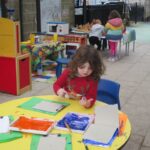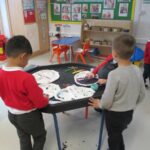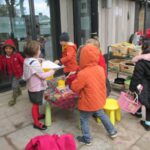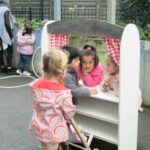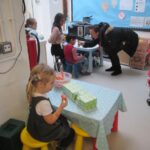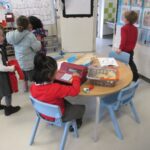Play can develop determination, concentration persistence and a satisfying sense of “I did it!”
A play-based approach to teaching and learning is not a new idea.
The work of German researcher Friedrich Froebel (1782–1852) showed that young children build their understanding of the world by playful, child-initiated interactions with their environment (especially the natural world).
In Nursery and Reception classes children have extended opportunities to learn through play. Learning takes place both inside and outside and the classroom. Through a mixture of carefully planned adult activities and more spontaneous child led activities the children develop skills and understanding in the following 7 areas of learning:
The Prime Areas of Learning are;
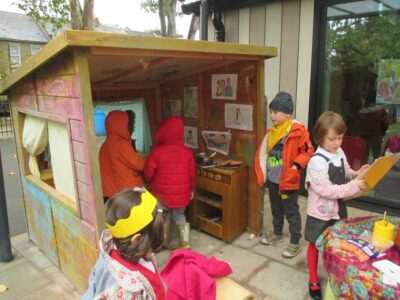 Personal, social and emotional development (PSED)
Personal, social and emotional development (PSED)
Children are encouraged to establish positive relationships with adults and other children. They learn to work co-operatively as part of a group, to understand what is right and wrong and why and to consider the consequences of their actions. Adults working in early years aim to encourage all children, to make sure that each child is given an equal chance to join in with the range of activities on offer and that all children feel equally valued as part of the whole group.
Communication and Language (CL)
Children have had the opportunities to develop their speaking and listening, reading and writing skills by sharing and enjoying many stories, rhymes and non-fiction books. We have also focused on identifying sound using the ‘Letters and Sounds’ programme.
Physical development (PD)
Children use a range of balancing and climbing apparatus to develop their co-ordination and awareness of space. They use a variety of sports equipment in class and team games. We also focus on using smaller tools, construction and malleable materials to practise skills
The Specific Areas of Learning are:
Mathematics (M)
Children learn about pattern, shape, and measures. They order, sequence and sort with objects and numbers through practical activities. They are encouraged to use mental strategies and skills as well as number rhymes, songs and games.
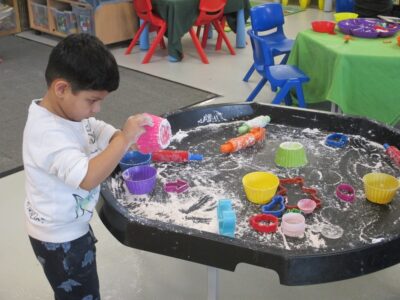 Understanding the World (UW)
Understanding the World (UW)
This area of learning includes science, history, geography, design technology, information technology and religious education within topics. We focus on providing the children with a range of activities and different equipment to investigate and use.
Expressive arts and design (EAD)
Children explore colour, shape, texture, form and space through a range of activities in art, music, dance, stories and imaginative play. We provide them with opportunities to express and communicate their ideas and feelings.
Children come to school with different experiences and progress at different rates and some children will need additional support with some aspects of their learning, whilst others need extra challenges.
Children’s progress is carefully monitored through Nursery and Reception and learning tailored to their needs and interests. Teachers will share children’s next steps with you at regular intervals and you can see them displayed in their classrooms. Parents’ contributions to children’s learning are strongly encouraged and we welcome your feedback on learning that is taking place outside school.
At the end of the Reception year children’s progress is assessed against the Early Learning Goals and the Early Years Foundation Stage Profile.
To find out more about what your child learns in Early Years (Nursery and Reception) and how you can support at home, please click on this link.
Click to access What-to-expect-in-the-EYFS-complete-FINAL-16.09-compressed.pdf
2 2023 Reception Curriculum (1)

